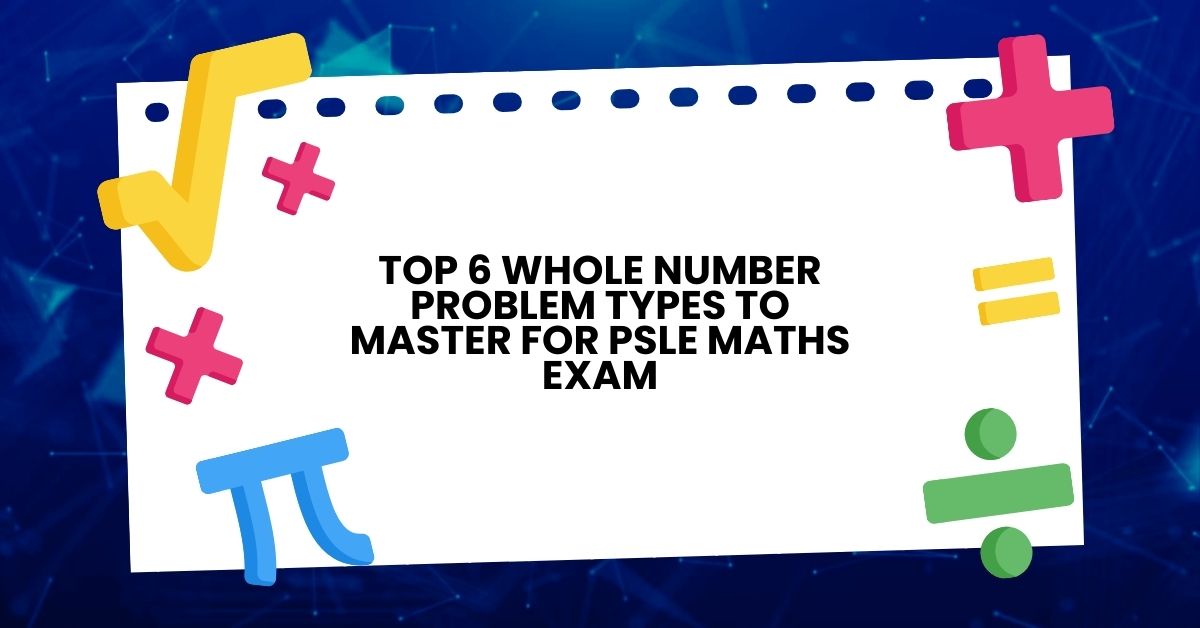Whole numbers are one of the most important building blocks in primary school mathematics—and a major part of the PSLE Maths exam. At Explico, we’ve seen how mastering the different types of whole number problem sums can significantly boost your child’s confidence and performance.
In this blog, we’ll walk you through the top 6 most common whole number problem types that every PSLE student should know—plus some helpful tips along the way. Whether you’re just getting started or need a quick revision boost, this guide is for you!
1. Addition and Subtraction with Word Problems
What to Expect:
These questions test your child’s ability to apply basic operations to real-life scenarios—like total amounts, change, or comparing quantities.
Skills Needed:
- Understanding keywords like more than, less than, difference, total, altogether
- Choosing the correct operation
- Showing clear working steps
Example:
Ali has 348 marbles. He gave 127 marbles to his friend. How many marbles does he have left?
Tip from Explico: Encourage your child to highlight keywords and rewrite the problem in their own words before solving it.
2. Multiplication and Division with Remainders
H3: What to Expect:
These problems often involve equal sharing, grouping, or situations involving remainders, which many students overlook.
Skills Needed:
- Mastery of multiplication tables
- Division with and without remainders
- Interpreting real-world meaning of a remainder
Example:
86 apples are packed into bags of 6. How many bags are needed?
Tip from Explico: Remind your child that if there’s a remainder in packaging-type questions, they may need to round up the answer.
3. Two-Step or Multi-Step Problems
What to Expect:
These questions combine two or more operations. It’s crucial for students to break the problem into smaller parts.
Skills Needed:
- Logical sequencing
- Identifying which operation to do first
- Avoiding careless mistakes
Example:
John has 4 boxes. Each box has 25 pencils. He gave away 30 pencils. How many pencils does he have left?
Tip from Explico: Use the bar model method to visualise the problem—this is especially helpful for multi-step questions.
4. Comparison Problems
What to Expect:
Comparison problems are all about understanding how much more or less one quantity is than another.
Skills Needed:
- Recognising comparative phrases
- Drawing models to visualise relationships
- Accurately subtracting large numbers
Example:
Sarah has 230 stickers. Emma has 145 fewer stickers than Sarah. How many stickers does Emma have?
Tip from Explico: Practice drawing comparison models. This helps in both understanding and explaining answers clearly.
5. Working Backwards Problems
What to Expect:
Students are given the result and must figure out what happened before. These are slightly more challenging but very common in exams.
Skills Needed:
- Reversing operations logically
- Step-by-step problem solving
- Careful reading
Example:
Jane had some money. She spent $35 and now has $120 left. How much money did she have at first?
Tip from Explico: Encourage your child to write equations backward, starting from the final result and working to the beginning.
6. Number Pattern and Relationship Problems
What to Expect:
These problems explore number patterns, sequences, and relationships—sometimes within tables or diagrams.
Skills Needed:
- Spotting patterns
- Using multiplication or addition rules
- Applying logic and deduction
Example:
A pattern starts with 2, 4, 8, 16… What is the 6th number in the pattern?
Tip from Explico: Train your child to write down the pattern step-by-step before guessing or jumping to an answer.
Why This Matters for PSLE
In PSLE Maths, problem sums can account for up to 60% of the total paper. That’s why building confidence in these 6 types is essential—not just to score higher, but to think better. At Explico, our AI-powered assessment tools and adaptive learning system make it easy to identify your child’s weak areas and personalise their practice.
Master Whole Numbers with Explico
We believe that the key to PSLE success is smart practice—not just more practice. With Explico’s online platform, your child can:
- Take timed assessments aligned with MOE syllabus
- Get instant performance insights
- Focus on targeted improvements in key topics like Whole Numbers
Ready to give your child an edge in PSLE Maths? Sign up for a free trial with Explico today and watch their confidence soar!
Got a specific question about Whole Numbers or any other PSLE topic? Drop it in the comments or reach out to our team—we’re always happy to help!


